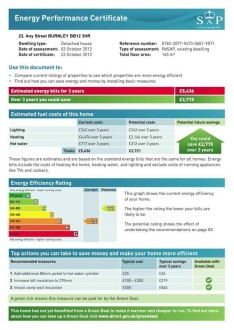Energy Performance Certificates
 Energy Performance Certificates (EPC) are being introduced to help improve the energy efficiency of buildings.
Energy Performance Certificates (EPC) are being introduced to help improve the energy efficiency of buildings.
If you are buying or selling a home you now need a certificate by law. From October 2008 EPCs will be required whenever a building is built, sold or rented out.
The certificate provides 'A' to 'G' ratings for the building, with 'A' being the most energy efficient and 'G' being the least, with the average up to now being 'D'.
Accredited energy assessors produce EPCs alongside an associated report which suggests improvements to make a building more energy efficient.
What does an Energy Performance Certificate look like,
and what does it contain?
The certificate provides a rating for the building, showing its energy efficiency. The ratings are similar to those found on products such as fridges and are standard so the energy efficiency of one building can easily be compared with another building of a similar type.
For homes, two ratings are shown.
- The energy-efficiency rating is a measure of a home's overall efficiency. The higher the rating, the more energy-efficient the home is, and the lower the fuel bills are likely to be.
- The environmental impact rating is a measure of a home's impact on the environment in terms of carbon dioxide (CO2) emissions - the higher the rating, the less impact it has on the environment.
Each rating is based on the performance of the building itself and its services (such as heating and lighting), rather than the domestic appliances within it. This is known as an asset rating. The certificate also lists the potential rating of the building if all the cost-effective measures were installed.
The ratings will vary according to the age, location, size and condition of the building. The potential rating on the certificate will take these factors into account, and the suggested measures will be tailored so that they are realistic for the particular building.
The certificate also includes a recommendation report, providing information about ways to improve the energy performance of the property. Recommendations include cost effective improvements and further improvements (that achieve higher standards but are not necessarily cost effective). For each improvement the level of cost, typical cost savings per year and the performance rating after improvement are listed. The potential rating shown on the certificate is based on all the cost effective recommendations being implemented.
You don’t have to act on the recommendations in the recommendation report. However, if you decide to do so, it could make your property more attractive for sale or rent by making it more energy efficient.
In addition the EPCs must convey several other key pieces of information:
Reference information
This includes the type of property (e.g. house, flat), the unique reference number (as stored in the central register) and date of the certificate.
Estimated energy use
This is based on standardised assumptions about occupancy and heating patterns. An estimate of the current and potential energy use, carbon emissions and fuel costs for lighting, heating and hot water is provided. The actual energy use depends on the behaviour of the occupants.
Energy Assessor details
This includes the assessor's name, accreditation number, company name (or trading name if self employed) and contact details.
Energy advice
The certificate provides basic advice about energy efficient behaviour.